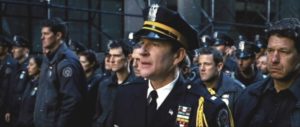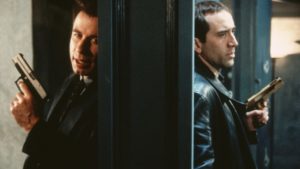If you pay even a sliver of attention to people’s critiques of TV and film, then you understand that great screenwriting isn’t necessarily a given, even for shows and movies that have made it all the way to the finish line. In fact, bad writing is actually pretty prevalent.
But what is ‘bad writing’? What can be classified as bad writing? Everybody’s taste is different and subjective. But we’re talking about the kind of bad writing that feels out of place in otherwise great movie or TV shows. It’s writing that takes you out of what you’re watching.
Bad writing in this context could be synonymous with lazy writing. It’s writing that takes advantage of your engagement, dropping the ball on an aspect of the story.
It’s not a coincidence that a lot of the below examples are from well established movies or TV shows. Creators can assume audience engagement and forget about the details, taking for granted that audiences will keep watching.
Convoluted plots, yawning narrative holes, generic characters, grating dialogue, nonsensical plot devices – these are just some of the elements that can be considered bad writing.
We’ve got 15 specific examples of bad writing in good movies and television shows. These are typically great films or TV shows but we’ve highlighted moments that drop the ball, taking advantage of the audience’s engagement and forgetting to interrogate whether the basic elements of the script hold up.
Example #1 – The Dark Knight Rises

Did the writers get lazy whilst wrapping up Christopher Nolan’s Dark Knight trilogy? It certainly feels that way in places during The Dark Knight Rises.
The movie still has all the hallmarks of Christopher Nolan’s great direction. Thrilling set-pieces, impressive scale, amazing action. All these characteristics make it a great movie.
However, the writing definitely feels noticeably weak. This is most notable in the broader plot movements.
The most notorious example of this is Bane trapping the police in the Gotham sewers in order to take over the city.
- Why does the Gotham police send its entire police force into the sewers so easily?
- How exactly are they able to survive?
- Would they so easily come out after being trapped for five months and immediately rush to fight Bane?
The plot line seriously strains at credibility. It feels like lazy plotting. Desperate to bring everything together the script forgets to make the logistics make sense.
It’s an all too convenient way for Bane to achieve his goals and a contrived way of setting up a grand showdown.
Example #2 – Avatar
![]()
Avatar changed the game when it came out in 2009. It feels unarguable that in the technology it pioneered alone it is a good movie.
Add to that stunning visuals, massive ambition and imagination and it’s understandable why many people still love it to this day.
However, that doesn’t preclude it from some bad writing throughout, mostly in some of its scientific concepts.
The biology and science behind Jake taking the form of a Na’vi never really convinces. What is exactly happening in that pod?
Most of all though, the movie’s bad writing is evident in the name of the precious mineral the humans seek to get hold of – Unobtanium. Get it? As in it’s unobtainable for them. Subtle.
Avatar shows how in such an epic, large scale feature the details need just as much interrogation as the bigger picture elements. Specific scientific elements are a lot easier to change in the genesis of the idea than huge special effects in post production. But both will come under the same microscope of scrutiny.
Example #3 – Game of Thrones
Yes we are mainly talking about Season Eight. It has been much publicised how much of a let down the final series of Game of Thrones was. This was particularly in the context of the writing.
Bad writing can be found throughout the show’s eight seasons. Themes and story can be expressed in heavy-handed ways and often the plotting strains for believability. However, it is admittedly most evident in the final two seasons.
Primarily, the plot becomes so condensed that arcs that previously would have unfolded over whole seasons, instead unfold in a single episode.
Condensing the plot in this way is a great lesson to all screenwriters.
- It shows how once you forcibly try and move the plot along quicker than feels natural, all the other elements can potentially fall victim.
- The dialogue becomes overly expositional, characterisation no longer feels believable, tonal shifts are harder to swallow.
This is all because the screenwriters are so desperate to get from A to Z there is little room for skilful exposition, nuanced characterisation or subtle drama. Everything becomes about driving the plot forward and all other important elements begin to be hollowed out.
Example #4 – Gone Girl
As a thriller, Gone Girl is David Fincher at his finest. It’s a great watch. However, that doesn’t stop the writing from feeling contrived throughout, mainly in its plotting and characterisation.
The narration is largely inconsistent throughout also. It seems to appear when it’s most convenient to reveal the plot. This is perhaps a hangover from the book.
The way the plot unfolds feels unnatural. It feels like the narrative is being told in this way to maximise tension for the viewer, rather than playing out in a naturalistic way.
- Amy’s characterisation is perhaps the most prominent example of bad writing within the movie.
- Ultimately, a relatively complex character within the book becomes quite a cliched villain within the movie.
Amy is cold and manipulative in how she carries out her plans. It’s hard to get a sense of the motivations behind her actions and she feels, ultimately, quite a stereotype. Gone Girl feels like an example of tone being prioritised over characterisation – a dangerous game to play.
Example #5 – Signs
Signs is a compelling movie and successful in its primary objective – to terrify its audiences. Who can forget that birthday party video? Or the first interference heard on the radio? Or a terrifying scramble in the dark?
Furthermore, the characterisation is brilliant. The family is so believable in its dynamic. In their backstory, individually and collectively, we are greatly emotionally invested.
However, by the end of the movie it’s hard to not think that the plot resolution is a bit, well…silly. At the time it is thrilling. But ultimately the way all the character’s stories collide to defeat the invading aliens is pretty contrived.
The most glaring example of bad writing though is in the aliens’ fatal flaw. Water? Really?
- If the aliens are allergic to water surely they would have been unable to get this far on earth already?
- What about the water in the atmosphere?
- What about the water on the dew in the corn fields where we see the aliens running around?
- Is the most apparent example of water on earth present in glasses left around a house?
Perhaps M. Night Shyamalan has answers to these questions. Regardless, it’s hard not to walk away from Signs with the nagging feeling that the core idea has been poorly conceived. However strong the other elements, the basic structure of the idea feels wobbly.
Example #6 – The Wire (Season Five)

Let’s be clear. The Wire is probably the greatest written TV series of all time (we see you Sopranos).
However, some of the plotting within the fifth and final season of The Wire, strains at credibility.
In particular we are talking about Jimmy McNulty’s arc.
- Feeling at his wit’s end with the system, Jimmy decides to fake a serial killer.
- He does this in order to rinse money out of the police department.
- He wants the money for the investigation that he really wants to pursue.
It’s not so much the nature of this plot arc that feels contrived. In fact, it still serves as a brilliant inditement of the way that the police and the media operate.
- However, Jimmy goes from frustrated cop to crazed criminal in a matter of one or two episodes.
- Jimmy’s transition never feels that believable.
- It’s perhaps the lack of a naturalistic build-up that makes it feel this way.
We watch through our fingers as Jimmy fakes serial murders. This never felt like a feeling that the show induced prior.
It’s worth noting that the fifth series is considerably shorter than the previous series’ (10 episodes instead of 12 or 13). This condensing and rush feels responsible for the contrivance of the main plot arc. It’s a great example of how plotting should take as long as it needs to.
Obviously within network limitations (HBO only ordered 10 episodes) the show has to do what it does. But it shows the importance of taking your time when stitching together a complicated story, otherwise that story misses important emotional, dramatic beats and starts to feel simplistic.
Example #7 – Darkest Hour
Joe Wright’s Winston Churchill biopic, Darkest Hour, was nominated for Best Picture in 2018 and won Gary Oldman Best Actor at the Academy Awards.
The movie largely serves as a compelling portrait of Britain during World War II. Furthermore, Gary Oldman’s performance is rich and entertaining.
However, the movie contains a lot of bad writing. It particularly feels like bad writing when considering these events really happened. The script takes liberties to prove the strength and charisma of Churchill’s character.
- His speeches exist within the movie in a way that feels unrealistic. That is, they are heroic and soaring, with those listening undeniably moved.
- The script doesn’t feel like it separates how we view Churchill’s speeches now from the context of the time.
Most memorably, the movie contains a remarkably contrived scene where Churchill catches the London Tube.
- On his journey he encounters ‘regular people’ and asks them what they think he should do in regard to the war.
- Invented and historically inaccurate, the scene is bad writing because it invents a scene that feels instantly unbelievable.
- It does this in order to lazily convey plot (in the moving forward of the plan to deal with Hitler) and prove Churchill’s strength of character.
The reality of the story makes us view the story with extra scrutiny. It doesn’t need to follow everything that really happened in exhaustive detail. But forcing together elements in order to move the plot along feels contrived.
Example #8 – The Newsroom

Perhaps not Aaron Sorkin‘s most widely praised work. But regardless, The Newsroom, in its witty and fast moving portrayal of cable news, remains vastly popular.
A scene widely held up as an example of great writing feels, to us, like bad writing. We’re talking about the widely discussed ‘America is not the greatest country in the world anymore speech‘.
It is a monologue that is delivered in the opening scene of the pilot episode.
Yes the content of the speech is brilliant in its astute commentary on the state of America. Yes it’s a satisfying takedown of the idea of America as the ‘greatest country in the world’. But that alone does not make for great screenwriting.
- The monologue doesn’t feel like the voice of the character, it feels like the voice of the writer.
- It’s too perfect in how it is delivered. It is a word perfect takedown that goes on for almost five minutes.
- It lionizes the character delivering the speech, whilst belittling all the other characters (not least the paper thin ‘sorority girl’ who prompts the speech).
Overall, people marvel at this speech because it is a well-written assessment of American politics. However, that doesn’t make it good dramatic writing. Ultimately, it feels like a polemic likely to be found in a magazine more than a slice of drama.
Example #9 – Riverdale
Guilty pleasure at its finest, Riverdale is a great watch for those who love drama.
The entire idea of the show is ridiculous – who looked at the Archie comics and thought, “You know, we could make a dark teen drama out of this”? Not just the overarching concept of the show is ridiculous, but practically every plot line is as well.
Dialogue? It offers cringe lines like “Sorry Cheryl Bombshell, my specialty is ice” and “The Pembrook is a fortress and Andre is trained in the martial arts.”
But ask anyone who watches the show and they’ll tell you it’s a great time. The show is mysterious, intriguing and suspenseful. Not only that, but the characters are lovable despite how dumb and clueless they can be.
Example #10 – Face/Off

The very concept of Face/Off feels an example of bad writing.
- The entire idea is that an FBI special agent goes through a procedure to literally steal the face of his terrorist enemy.
- He does this in order to find out more about a bomb set to go off in a few days time.
- Somehow the procedure also manages to change his voice, mannerisms, and bodily appearance to be identical as well. How does that work?
The plot is certainly contrived. Add on a whole bunch of cliches in the form of ‘you killed my son’, a coma, clueless secondary characters, terrible dialogue and gratutious violence.
Despite all this, Face/Off is still a fantastic movie.
John Travolta and Nic Cage together have great chemistry. They truly are the only ones who could sell such over-the-top insanity. Their acting turns the film’s unintentional bad-ness into its greatest strength.
It just goes to show that how you sell writing is just as, if not more important, than the writing itself.
Example #11 – Titanic

Sorry Leo fans, but Titanic isn’t exactly a screenwriting marvel.
At its heart, the story is a basic, cliched ‘love’ story. Boy and girl meet, fall in love and tragedy strikes.
The movie doesn’t seek to transform that basic equation and ultimately, that’s fine. However, it doesn’t do itself any favors by giving viewers overly-cheesy lines and characters who are clearly infatuated rather than actually in love.
Oh, and they still could have both fit on that damn door.
Titanic is another example of a movie with large scale often forgetting about the details.
Why is Titanic still such a great movie? Partly, because it does have some moments of great writing, especially through how vulnerable the characters are and how they disregard social boundaries. It also obviously has impressive, large scale directing, gorgeous settings and strong acting.
Example #12 – The OA
Plot issues, oddly ambiguous explanations and a controversial ending mean The OA has more than its fair share of issues. But it offers just as much, if not more, good.
Two of The OA‘s biggest problems? We’re never quite sure if the protagonist is ever telling the truth. That unreliability can immediately take away the entire show’s impact, especially among viewers who want answers.
Even more important than that, the show doesn’t just leave us dots to connect.
- Instead, it basically gives us a huge pile of Legos and expects us to build a castle.
- Is that profound and innovative or is that just lazy writing?
The answer will depend on the viewer, but it at least gives most some skepticism and pause.
Despite these issues and some questionable writing, it’s still a truly original story that deals with difficult topics (like trauma) that others tend to shy away from. It also benefits from phenomenal acting, palpable passion and great production design.
Example #13 – Interstellar
Interstellar is a really good movie: ambitious, beautiful, and introspective.
However, Interstellar does suffer from its writing at times. Like many grand movies shoved into a too-short time slot, there are plot holes and loose ends.
For example, Cooper and his daughter spend the entire movie trying to get back to each other, only to then spend about two minutes with each other before splitting off.
Ironically, sometimes the most human moments of interaction feel less human than the spaces in between.
Interstellar’s compelling visuals and overarching ambition largely see the movie through. Furthermore, a handful of powerful, emotional scenes (such as Matthew McConaughey watching messages from his family) make up for some of the weaker written scenes.
Example #14 – Vice
Vice features an incredible performance from Christian Bale as Dick Cheney. It’s also an astute and powerful look at corrupting political power, with some inventive fourth-breaking and dynamic structure.
However, the script feels very heavy-handed in its attempt to make clear what it thinks of Dick Cheney. This rears its head most prominently in a scene towards the end where Dick Cheney speaks to camera and lays out directly his motives.
The movie is also overtly expositional in many of its dramatic scenes (such as the above).
- The script wants you to take it seriously.
- Yet it undermines itself by being so overtly expositional and obvious in getting across the plot (‘You already got your ass thrown out of Yale for drinking!’).
Vice is a movie that might leave you feeling angry at Dick Cheney. However, the movie undermines itself by making its intensions so clear and obvious.
Example #15 – Doctor Who
For years, Doctor Who has been saturated with plot holes, contradictions, and paradoxes that literally shouldn’t and can’t happen. The resulting explanation is often, well…”wibbly wobbley, timey whimey.”
The show has also had its fair share of weak story lines, dumb dialogue, and two-dimensional characters. It’s generally perceived as a show defined by silliness.
Despite it all though, it does have some great actors, amazing companions, visual appeal, and engaging imagination.
The Doctor is mysterious, complex, stubborn, and charismatic. He drives the show and makes it endlessly watchable. And despite a stagey feeling, some lines and speeches are fantastic (such as the ‘Zygon Inversion’ speech).
- What did you think of this article? Share it, Like it, give it a rating, and let us know your thoughts in the comments box further down…
- Struggling with a script? Story analysis is what we do, all day, every day…check out or range of services for writers & filmmakers here.
Get *ALL* our FREE Resources
Tackle the trickiest areas of screenwriting with our exclusive eBooks. Get all our FREE resources when you join 60,000 filmmakers on our mailing list!


Are you a college professor? That was an amazing, insightful post! Loved it.
Nice post.
Deep and expository. Dope piece!
Glad you enjoyed it!
“The following is an example of bad writing in good movies/shows.”
Proceeds to use Riverdale, Dark Knight Rises and Avatar…WHAT?
I wonder how much is changed by directors, as is often the case. They cut scenes, sometimes for the better and sometimes not. The actors also are known for changing dialogue, because they feel more comfortable with what they want to say, so is it fair to blame the writer?